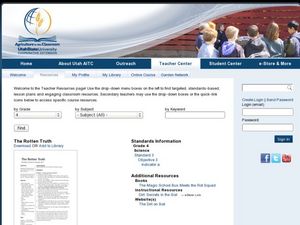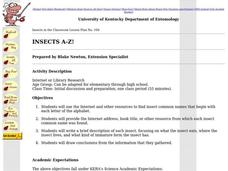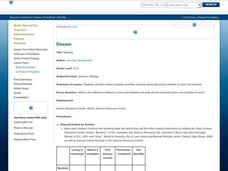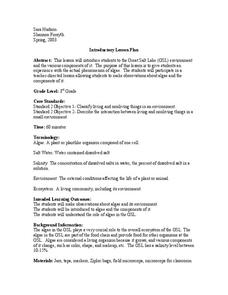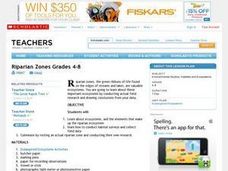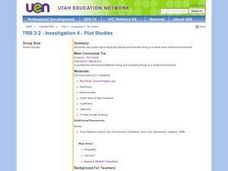Curated OER
The Rotten Truth
Fourth graders investigate compost. In this Science lesson, 4th graders take notes on the components of soil and its relation to plant growth. Students describe the steps in making compost.
Curated OER
The Soil Chain
Fourth graders show the needs of plants met by soil. For this Science lesson, 4th graders detail the components of soil and determine which are living or once living and non-living. Students determine the needs of plant growth that are...
Curated OER
Vermicomposting
Fourth graders explore insect life by viewing a soil presentation in class. In this composting lesson, 4th graders read assigned text about the process of composting soil and the necessity of soil in plant life. Students view video clips...
Curated OER
Animal Diversity
Students explore biology by completing science worksheets in class. In this animal anatomy lesson, students read the book The Adventures of Marco and Polo and identify the animals mentioned in it. Students examine a real life animal and...
Curated OER
Characteristics of Energy
Students explore Earth science by completing energy worksheets in class. In this energy forms lesson, students identify and define a list of energy vocabulary terms and a K-W-L chart. Students view a matter video clip in class and...
Pennsylvania Department of Education
Energy in Motion
Fifth graders explore energy transfer. In this thermal energy instructional activity, 5th graders stretch rubber bands several times and estimate the band's temperature change. Students identify this action as an example of thermal...
Curated OER
Describing an Object's Position
Learners explore language arts by participating in a shape identification activity. In this geometry shape lesson, students discuss the vocabulary terms used to describe the location of an object. Learners complete a worksheet based upon...
Curated OER
Some Similarities Between the Spread of an Infectious Disease and Population Growth
Learners compare and contrast the spread of infectious diseases and population growth. In this biology lesson plan, students identify the exponential growth pattern of spreading diseases. They relate this to HIV infection and AIDS.
Curated OER
Ecological Citizen
Students examine the interconnectedness of living and non-living things that constitute an ecosystem. They examine fallen trees,insects, living trees, leaves, food webs, and forests. They conduct various activities and write poems about...
Curated OER
Hatching Brine shrimp
Second graders investigate the life cycle using brine shrimp as an example. They conduct observations by watching the shrimp hatch out of cysts. Students design simple experiment to structure an observation. The experiment is approved...
Curated OER
What It Is, What It Isn't
Third graders classify and sort different types of beans to be introduced to the classification system in science. As a class, they identify the characteristics of living and non-living organisms and make a chart in their journal to ...
Curated OER
Detecting Systems
Fourth graders participate in a lesson plan that attempts to explain how a system works. They examine the parts and how they fit together. The question of what happens to a system if a pert is missing is asked.
Curated OER
Vermicomposting
Third graders study vermicomposting. In this vermicomposting lesson, 3rd graders prepare to begin a unit on decomposition by constructing a worm bin. Students collect worms to be used later in experiments.
Curated OER
Insects A-Z!
Students use the Internet and other resources to find insect common names that begin with each letter of the alphabet. They write a brief description of each insect, focusing on what the insect eats and where the insect lives.
Curated OER
Disease
Students study the differences between viruses and bacteria. They educate others to the harms and benefits of each by making a newspaper ad, pamphlet or informative article.
Curated OER
DID YOU HELP CREATE THIS
Students examine whether their actions are positively or negatively affecting organisms and their habitats. They choose an animal to study then create a multimedia presentation including charts and graphs of data logger information and...
Curated OER
Is Soil Alive?
Third graders observe soil samples. They then form hypotheses as to whether or not soil is alive. Students read and discuss information about soil and components of soil. They state wheter or not they believe soil is alive and list...
Curated OER
Great Salt Lake
Third graders are introduced to the Great Salt Lake (GSL) environment and the various components of it. They make observations about algae and its environment and discuss why it is considered a living organism and various components of...
Curated OER
Introduction to Macroinvertebrates
Third graders investigate the world of macroinvertebrates and identify the environmental stressors that threaten their existence. Outdoors, they role-play as stressors and invertebrates, with the intolerant species doing pushups, spins,...
Curated OER
Riparian Zones Grades 4-8
Students examine and analyze the Riparian Zones found on the edges of streams and lakes. They assess why those are such valuable ecosystems and then conduct actual field research on riparian zones and conclude by drawing conclusions from...
Curated OER
Principles of Ecology
In this ecology worksheet, students will fill in a graphic organizer showing the relationship organisms have with their environments and with each other. This includes biotic and abiotic factors, tropic levels, and ecological pyramids....
Curated OER
Junior Engineering Surface Water
Students experience the effects of pollution and erosion on a model of a watershed and explore ways to change the outcome.
Curated OER
Investigation 4 - Plot Studies
Third graders use a plot map to study the plants and animals living in a small area of their environment.
Curated OER
Rikki-Tikki Research
Fourth graders perform a search on mongooses on Internet Explorer and answer research questions.
Other popular searches
- Living and Nonliving
- Living and Nonliving Things
- Living Nonliving
- Living or Nonliving
- Science Living and Nonliving
- Living vs Nonliving
- Living and Nonliving Cells
- Nonliving Things
- K 2 Life Science Nonliving
- Living vs. Nonliving
- Living/nonliving
- Living and Nonliving Organisms


